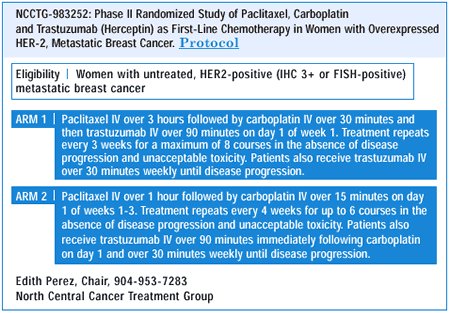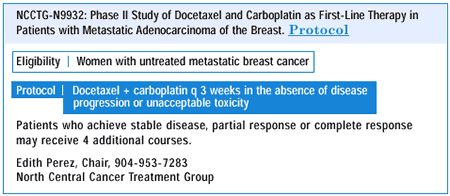| You are here: Home: BCU 1|2002: Edith A. Perez

Edited Comments by Dr Perez
NON-ANTHRACYCLINE REGIMENS FOR ADVANCED DISEASE
Our group has been concentrating on trials of non-anthracycline regimens for patients with advanced disease, because a majority of patients receive anthracyclines in the adjuvant setting. There are a number of agents available that appear to provide fairly similar benefits, but we do not have definite phase III studies demonstrating that one is absolutely better than another.
We started this process in 1995 with studies of paclitaxel and carboplatin as alternatives to anthracyclines, and that has evolved to a series of other trials. We’re still very interested in the taxanes for the management of advanced breast cancer, and we currently
have two major trials addressing this. One evaluates docetaxel in combination with carboplatin as first-line chemotherapy. It makes a lot of sense for us at the NCCTG to perform this trial, as we performed the original paclitaxel and carbolatin study in the United States. We are also conducting a first-line trial in patients with HER2-positive breast cancer evaluating two different schedules of paclitaxel and carboplatin in combination with trastuzumab, either weekly or every three weeks.


RATIONALE FOR ADJUVANT TRASTUZUMAB TRIALS
The data from NSABP B-15 have not been published in full but are contained within the background of the NSABP B-31 protocol. We see poorer outcomes in patients with node-positive, HER2-positive breast cancer, who only receive AC chemotherapy. Even patients with one to three positive nodes have only a 50-50 chance of being alive and free
of disease at five to ten years. We must try to improve their survival rate, and trastuzumab is the best agent we have right now that is targeted specifically to this group of women.


Page 1 of 2
Next Page
|
